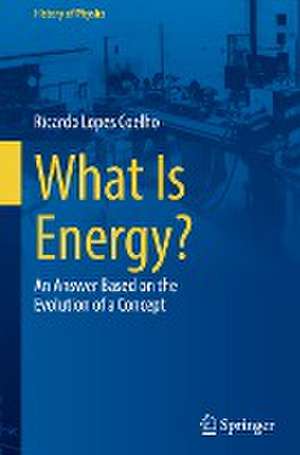What Is Energy?: An Answer Based on the Evolution of a Concept: History of Physics
Autor Ricardo Lopes Coelhoen Limba Engleză Hardback – 16 feb 2024
Following the development of the concept, it provides an explanation of the trends in contemporary textbooks. The author's repetition, in his "History and Philosophy of Physics Laboratory", of Joule’s famous experiment – the paddle wheel experiment – with a calorimeter as originally used by Joule and with a calorimeter as proposed in textbooks, is presented, yielding new insight into the phenomenon. Thus, science teachers andstudents will benefit from reading the book as well as historians, philosophers, students of the history and philosophy of science, and all who are interested in knowing about what it is that we call energy.
Preț: 891.80 lei
Preț vechi: 1087.56 lei
-18% Nou
Puncte Express: 1338
Preț estimativ în valută:
170.64€ • 178.65$ • 141.20£
170.64€ • 178.65$ • 141.20£
Carte tipărită la comandă
Livrare economică 05-19 aprilie
Preluare comenzi: 021 569.72.76
Specificații
ISBN-13: 9783031518546
ISBN-10: 3031518543
Pagini: 195
Ilustrații: IX, 195 p. 37 illus., 8 illus. in color.
Dimensiuni: 155 x 235 mm
Greutate: 0.47 kg
Ediția:1st ed. 2024
Editura: Springer Nature Switzerland
Colecția Springer
Seria History of Physics
Locul publicării:Cham, Switzerland
ISBN-10: 3031518543
Pagini: 195
Ilustrații: IX, 195 p. 37 illus., 8 illus. in color.
Dimensiuni: 155 x 235 mm
Greutate: 0.47 kg
Ediția:1st ed. 2024
Editura: Springer Nature Switzerland
Colecția Springer
Seria History of Physics
Locul publicării:Cham, Switzerland
Cuprins
Introduction.- What was Discovered in the 1840s?.- A New Concept.- Reification of Energy.- Trends in Contemporary Textbooks.- Conclusion.
Notă biografică
Ricardo Lopes Coelho did his PhD and Habilitation at the Technical University Berlin, where he taught for several years. He has taught History and Philosophy of Science at the Faculty of Science, University of Lisbon for more than two decades. More recently, he created the History and Philosophy of Physics Laboratory, where historical experiments are carried out. His main research interest is the understanding of scientific concepts and principles through their history. On the concept of energy, he has published numerous articles over the last fifteen years. In the present book, he revisits some of those theses in a more in-depth context, among other things, among other things performing an analysis of contemporary textbooks and presenting the results of experiments carried out in his laboratory, material that has not appeared in the literature to date.
Textul de pe ultima copertă
This book provides a solution to the problem with the energy concept. This problem manifests itself in the fact that physicists clearly diverge regarding the question of what energy is. Some define it but others state that we do not know what it is. Although this is a problem for physicists who need to explain the concept, it is not a problem for physics that can be solved by laboratory means. Penetrating into the origin of the notion of energy, this book offers a clear idea of what was discovered and what was invented to interpret the findings.
Following the development of the concept, it provides an explanation of the trends in contemporary textbooks. The author's repetition, in his "History and Philosophy of Physics Laboratory", of Joule’s famous experiment – the paddle wheel experiment – with a calorimeter as originally used by Joule and with a calorimeter as proposed in textbooks, is presented, yielding new insight into the phenomenon. Thus, science teachers andstudents will benefit from reading the book as well as historians, philosophers, students of the history and philosophy of science, and all who are interested in knowing about what it is that we call energy.
Caracteristici
Presents a clear idea of the concept of energy by studying original experiments and theories Overcomes a longstanding problem for science teachers and students Aids all those interested in understanding energy, its origin, and its rapid and unlimited growth










